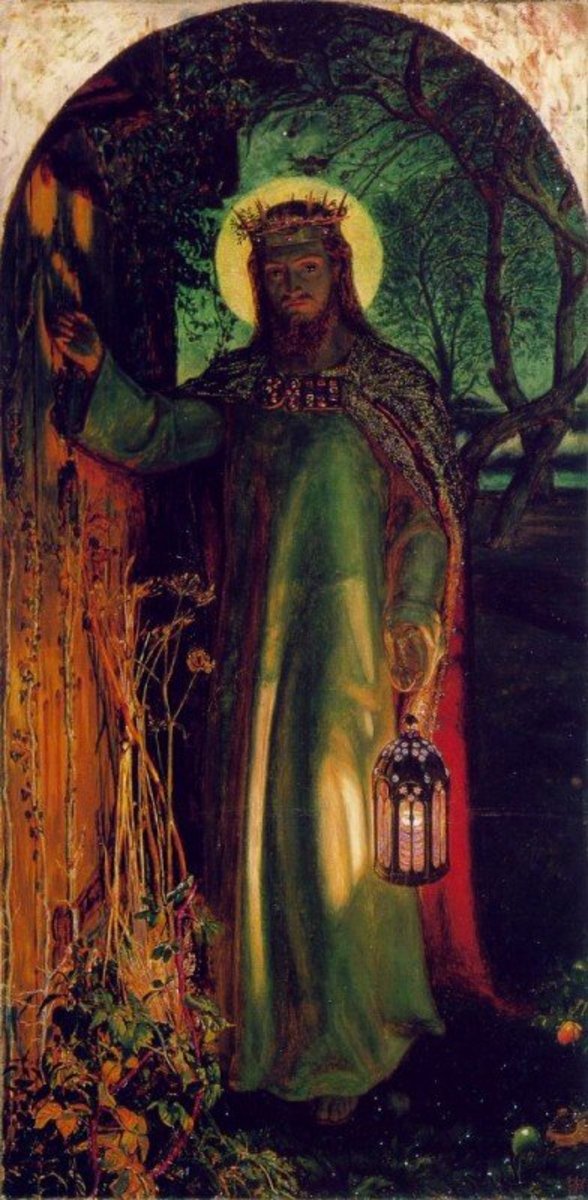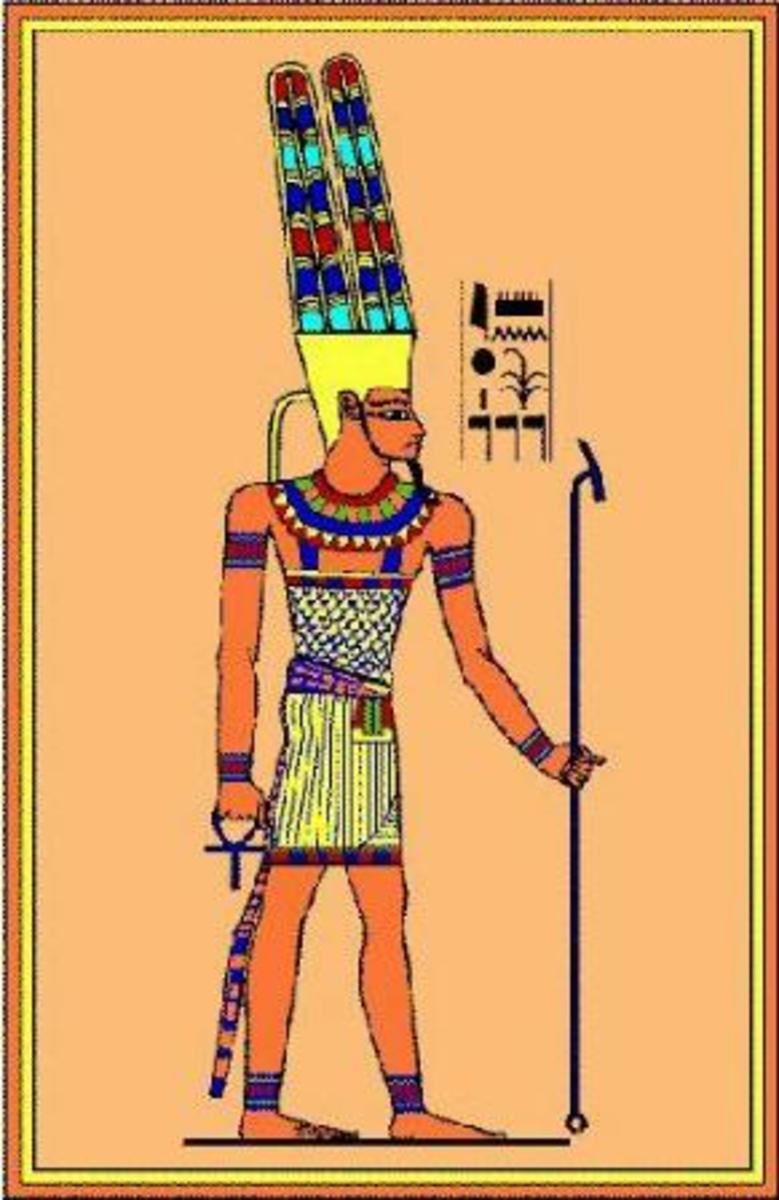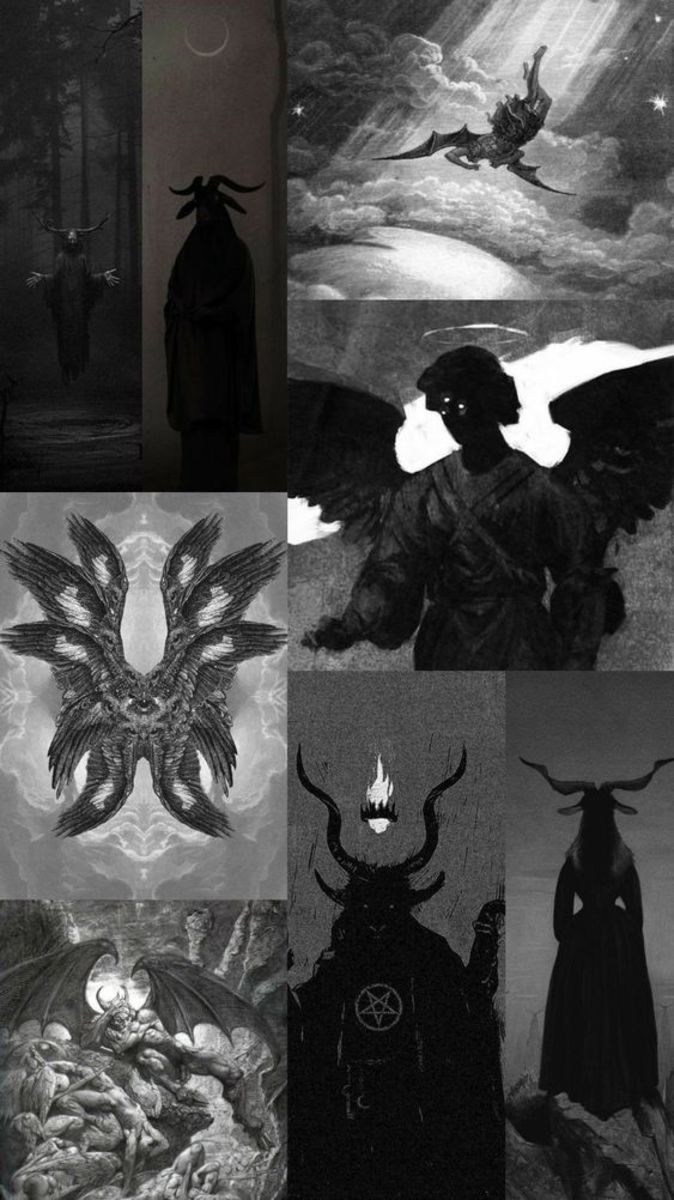Who is the devil? Part One

Satan is an interesting subject because, for all the talk about what he has supposedly done, there is very little told about him in the Old Testament. Very few stories deal with him specifically. There is also very little mention of what he has done that could be considered evil, though he is attributed with doing everything that is evil, or at least having his hand in it.
His creation is never mentioned in Genesis nor anywhere in the Old Testament. We assume that when god created the heavens and the earth, he created the angels at the same time, but there is no evidence of this in the bible itself. The angels could have been created after man, or before man. It just doesn't tell us about their creation at all. In fact, in the OT, they are not angels at all but the sons of god.
Time and time again I must go back to my original question about this situation. If we apply a bit of logic, we can see that if god is all powerful and all knowing, he knew what Satan would become even before he created him. He could have destroyed Satan at will, but he didn't. Instead, god supposedly sent him to earth. Why?
If god wanted man kind to do well, don't you think he would have known that placing Satan here would destroy any chance of that? Did he not have some uncounted billions of other star systems he could have exiled him to? Of course, back when the bible was written no one knew that.
None of it makes any sense. Christians say that Satan wasn't destroyed because god loved him so. But this is then amended in revelations by the fact that god already has a plan to get rid of Satan once and for all.
How elaborate this all becomes. The earth is the center for a war which is already won. The scripture tells that god will win the war; it is predestined. Yet if it is predestined, then all events that lead up to that point are also predestined. There can be no cause without an effect, and no effect without cause. Either free will exists or it does not.
If pre-destiny exists, then free will cannot. If free will exists, then pre-destiny cannot.
Why couldn't god get rid of Satan from the beginning if that was his plan? Obviously, this is a vicious circle which religion cannot break free from. If you have a loving god then it does not create Satan. But if you live in a world with fear and evil, then it must come from somewhere. If not your god, who is supposedly all love, then from another source that is pure hate.
Yet this loving god creates this evil and then sets it free upon mankind. What does this say about the Christian god?
Below are the versus from which Christianity fetches its Satan. You will notice that he is not called Satan in most of these texts. He is called Tyrus by Ezekiel, and Lucifer by Isaiah.
Before Isaiah, devils are mentioned in terms of the worship of "false gods" and idols, as in Lev 17:6 and Deu 32:17 and in CH2. But "The devil" is nowhere to be found in the OT. CH1 21.1 Mentions the word Satan for the first time only briefly. He is not mentioned again until Job. In Job we see a conversation between Satan and god in which Satan talks god in to testing Job. Let’s look at that story in more detail.
JOB 1:6 Now there was a day when the sons of God came to present themselvesbefore the LORD, and Satan came also among them.
JOB 1:7 And the LORD said unto Satan, Whence comest thou? Then Satan answeredthe LORD, and said, From going to and fro in the earth, and from walking up and down in it.
So first of all we see that god didn’t know where Satan had been, which is strange if he put him there as a punishment. And it seems that Satan can come and go as he pleases, which seems to tell us this is before Satan is thrown out of heaven, if he ever was.
JOB 1:8 And the LORD said unto Satan, Hast thou considered my servant Job, that there is none like him in the earth, a perfect and an upright man, one that feareth God, and escheweth evil?
JOB 1:9 Then Satan answered the LORD, and said, Doth Job fear God for nought?
JOB 1:10 Hast not thou made an hedge about him, and about his house, and aboutall that he hath on every side? thou hast blessed the work of his hands, and his substance is increased in the land.
JOB 1:11 But put forth thine hand now, and touch all that he hath, and he will curse thee to thy face.
JOB 1:12 And the LORD said unto Satan, Behold, all that he hath is in thy power; only upon himself put not forth thine hand. So Satan went forth from the presence of the LORD.
Here we get the first glimpse of the relationship between God and Satan. He is not cast in to hell here, but seems to have a free run of all creation. He is obviously not barred from heaven, as is said by some, but comes along with the other sons of god to have a talk with their father.
This fact alone is amazing. We are always told that Jesus is the only son, but here we are told that the angels are the sons of god as well. Or are there others? Are there angels, and sons of god? Christianity certainly doesn't believe that. But Judaism did, so we may assume that Satan is a son of god.
This idea is borne out by the casualness of the conversation that takes place between the two; they are not portrayed as enemies in any way. Their relationship is most cordial.
Satan plays a game with god. He tempts god through god's vanity and god plays along. Or is it god that is directing this encounter. Either thought is equally disturbing. I think it disturbing to believe that god can be tempted, but it is equally disturbing that god should have initiated this encounter only to prove a point. To who would he have been proving this point? To himself? To Satan?
As it turns out, the original Hebrew word "Satan" means "The Accuser." Many Jewish scholars see this as the personification of the "doubt" in god's mind. The Jewish people saw Satan as the one who reported events to god and made accusations on "behalf" of god. This would be much the same as calling him a policeman or spy for god. God says Job hates evil but does not imply that Satan is evil.
Here in Job, Satan is examining this seemingly pious man and says to god. "You know, I don't trust this Job character. Let’s put him to the test." If the relationship between god and Satan was not that of master and spy, then the only other conclusion we can draw is that god is blind to his evil son’s trickery. Does Christianity really want to adopt this stance?
I think it is also important to note that, as I mentioned above, god does not seem to know where Satan has been. This does not bode well for the belief of an omnipotent god. One would think that of all the creations he had made, if Satan was evil, he would certainly want to keep track of this one’s whereabouts.
Never the less, this is a classic Greek relationship between gods. Greek myth is full of such stories of gods being tricked and tempted. But one would think that a real omnipotent being could not be tempted or beguiled by anything.
This story shows that either god is so vain that he needs to prove to Satan that his servant Job will not doubt him no matter what, or he cares so little about this mere human that it just doesn't matter to him much, except as a point of amusement. Or this god is not omnipotent and "doubts" once in a while, as the Jews contend.
Well the story continues, and though god has said in his first conversation with Satan that Job is not to be harmed physically, he allows it in this second encounter with Satan, after Job has already passed the test.
I think it is also interesting that Satan listens to god, and obeys him. A truly evil Satan would have ignored god's will and done what he pleased with Job. But even Satan seems to have some kind of morality and self control. Or an inability to do other than god’s bidding, which would imply Satan has no free will. Yet without it, he could only be evil because god wants him to be. Another idea Christianity could not tolerate. But it is the only logical conclusion if Satan has no free will. Both of them seem to have rules for their conduct.
JOB 2:1 Again there was a day when the sons of God came to present themselvesbefore the LORD, and Satan came also among them to present himself before the LORD.
JOB 2:2 And the LORD said unto Satan, From whence comest thou? And Satananswered the LORD, and said, From going to and fro in the earth, and from walking up and down in it.
JOB 2:3 And the LORD said unto Satan, Hast thou considered my servant Job,that there is none like him in the earth, a perfect and an upright man, one that feareth God, and escheweth evil? and still he holdeth fast his integrity, although thou movedst me against him, to destroy him without cause.
Funny he should phrase it that way." although thou movedst me against him, to destroy him without cause." Clearly, god sees that there is no cause to do any of this to Job. Yet for Satan's sake, he allows it to continue.
JOB 2:4 And Satan answered the LORD, and said, Skin for skin, yea, all that a man hath will he give for his life.
JOB 2:5 But put forth thine hand now, and touch his bone and his flesh, and he will curse thee to thy face.
JOB 2:6 And the LORD said unto Satan, Behold, he is in thine hand; but save his life.
JOB 2:7 So went Satan forth from the presence of the LORD, and smote Job with sore boils from the sole of his foot unto his crown.
This time Job is not too happy with his lot and does begin to regret his dealings with god. He wonders what he has done that god can be so cruel to him. At one point he cries out in anger and frustration that god would do such a thing to his servant. You will notice that he does not curse or blame Satan for his discomfort. He lays the blame squarely on the shoulders of god.
He "demands" an audience with god and, demands an explanation. This is as close to blasphemy as any Christian would want to get. To demand something of god is serious business. But he never curses or denounces god, and that is the key.
What most Jewish scholars believe is that he wanted god to get so angry as to kill him on the spot, and end his suffering. But instead, god comes to him.
This scene was acted out in reality in the German death camps. The conditions there were so bad and so cruel that in one particular camp, the Jews, as a last resort to end their suffering, put god on trial for crimes against the Jewish people, and found him guilty.
To me, this is the most poignant story of the war. It says volumes about the faith of the Jews, and the Jewish faith; and it says volumes about their belief in an absolute monarchist god. This god is to blame for what befalls you, as well as to be praised for what he gives. To the Jewish people, there is no Satan in the Christian sense of that word. Satan is not evil, he is god’s cop.
Of course, in the end god gives Job back all his wealth and health. The moral of the story being that god is all that matters and no matter what we suffer, we must like it and shut our mouths about it. And if we do that, he will eventually reward us if and when he feels like it. But we are not to expect it.
And what about all the people in Job’s life who were killed? His wife and kids died for nothing. Is Job the only important one in this story? The others seem not to matter. Yet were your wife or husband and children murdered, would your next family really replace the first? Of course not. God didn’t restore them in this story, he just gave him new ones.
What twisted sort of love is this? What a vain and cruel god this would be if it were real. It seems to me that it would be the same as you or I saying to a friend: Go ahead and beat my son in to submission in my name, but I bet he'll still love me no matter what you do to him.
One has to wonder who heard these conversations between god and Satan. It is not said that it was told to anyone. But the writer seems to be a friend of Job named "Elihu" the son of Barachel the Buzite, who tells some of the story in the first person.
The message is the purpose of the story and whether an actual man called Job suffered all these disasters is of little concern to the subject at hand, though we are sure it was of concern to Job. What it says about the relationship between this Satan and god, god’s demeanor, and his casual attitude toward mankind, is evident.
The story was designed to make mankind fear god as much as any Satan and in fact we see there is little difference between the two. While god rewards for unconditional worship, he does not give unconditional love.
The Catholics say to people who are plagued with personal tragedy. "Look at Job. He never faltered and was rewarded in the end." But what they forget to say is that god did all this to Job on a bet. Satan in the OT is only interested in god’s wellbeing. The Jews did not see him as the evil one, they saw him as the accuser.
So if Satan was originally only interested in gods well being, where did this "ultra evil" Satan come from? It came from the Christian mind, of course, because the Jews had no evil Satan myths or legends. So how does Christianity tie their own brand of Satan to the Old Testament? For some of these answers we go to Ezekiel and Isaiah. Let’s just call him the devil, as it seems the OT Satan is not him.
Tyrus was a port town full of riches and wealth in the time of Ezekiel the priest. From the vision he had of the last days, (and I cannot help thinking of his prophecy as being part of the "basis" for Christianity's "Revelations") this one man brought Christianity its image of the evil one. But really he didn’t.
In the context of the entire frantic story, god gives only a passing lamentation. The rest of the story portrays god as being livid and seething with anger for the Jews as he lays down some more laws.
Christian scholars personified evil in Ezekiel's "King of Tyrus". But Ezekiel was just building upon what had come before. He answered Isaiah's question, and I don't think it was by accident. I think he intended to:
ISA 14:12 How art thou fallen from heaven, O Lucifer, son of the morning! how art thou cut down to the ground, which didst weaken the nations!
But Isaiah wasn't talking about the devil at all, he was talking about a man. This is shown in this next passage. And If we compare this to Job then we see that Satan wasn't expelled at all, but was given free title to walk about as he pleased in heaven or on earth.
ISA 14:16 They that see thee shall narrowly look upon thee, and consider thee, saying, Is this the man that made the earth to tremble, that did shake kingdoms;
Notice that he does not call him an angel or a son of god, he calls him a man. This devil is not ethereal, he is flesh and blood. Some Jewish Scholars say this passage is talking about Adam and his fall from grace, not a devil. If you read it with that idea in mind, it fits. Some say this talks of a king, perhaps the King of Tyrus. Some have even said that Tyrus was Atlantis, and that the lament is for the lost city, as is Ezekiel's. But that isn’t likely.
Recent evidence of a much higher culture have been found around the Island that now still stands. Their civilization was destroyed by Volcanoes that buried their land in the sea. Could this be the mythical Atlantis of the Greeks? Probably not, but it leaves a lot of room for speculation.
If you read the following passages of Ezekiel you will notice that there are three different lamentations. The first is to the port town itself, (The people in it, I presume) the second is for the prince of Tyrus. (from where we may get the "prince" of darkness) and the third is a lamentation for the King of Tyrus.
This is where the story of the expulsion from heaven is derived, according to many Christian sources. In these few lines we are asked to do more interpreting than in all the rest of the Bible put together, and as I said, he probably got the impetus for the "idea" from Isaiah.
One thing that is obvious to me and yet is missing even in the folk lore that surrounds the actual Bible., is that these passages, (if taken as being the description of a devil) could easily be construed to show that: evil too, is a trinity. The people represent the "spirit of evil" through the greed of mankind, the prince :"The antichrist", and "The king of Tyrus," the devil himself. "The unholy trinity". Glad I'm not writing a Bible, aren't you?.
And so it begins:
EZE 27:1 The word of the LORD came again unto me, saying,
EZE 27:2 Now, thou son of man, take up a lamentation for Tyrus;
EZE 27:3 And say unto Tyrus, O thou that art situate at the entry of the sea, which art a merchant of the people for many isles, Thus saith the Lord GOD; O Tyrus, thou hast said, I am of perfect beauty.
EZE 27:4 Thy borders are in the midst of the seas, thy builders have perfected thy beauty.
EZE 27:5 They have made all thy ship boards of fir trees of Senir: they have taken cedars from Lebanon to make masts for thee.
EZE 27:6 Of the oaks of Bashan have they made thine oars; the company of the Ashurites have made thy benches of ivory, brought out of the isles of Chittim.
EZE 27:7 Fine linen with broidered work from Egypt was that which thou spreadest forth to be thy sail; blue and purple from the isles of Elishah was that which covered thee.
EZE 27:8 The inhabitants of Zidon and Arvad were thy mariners: thy wise men, O Tyrus, that were in thee, were thy pilots.
EZE 27:9 The ancients of Gebal and the wise men thereof were in thee thy calkers: all the ships of the sea with their mariners were in thee to occupy thy merchandise.
EZE 27:10 They of Persia and of Lud and of Phut were in thine army, thy men of war: they hanged the shield and helmet in thee; they set forth thy comeliness.
We get the picture. The place was a marvel for these people. And then he says:
EZE 27:34 In the time when thou shalt be broken by the seas in the depths of the waters thy merchandise and all thy company in the midst of thee shall fall.
EZE 27:35 All the inhabitants of the isles shall be astonished at thee, and their kings shall be sore afraid, they shall be troubled in their countenance.
EZE 27:36 The merchants among the people shall hiss at thee; thou shalt be a terror, and never shalt be any more.
As you can see, this lamentation was directed with some "affection" toward a city. Perhaps Ezekiel marveled at that place. He beheld it with both fascination and fear, and it colored his writing. Fascination with all the new and wonderful material goods from all over the world, and the same fear of the unknown that cities can represent to us, even today. But there is lacking a reason for god to destroy the city, except perhaps the fact they the people had so much pride in it, and he is almost lamenting the fact that he has to.
In any case, Tyrus, known as "Tyre" was an ancient sea port of Phoenicia that flowered from the 12th to the 8th century BC. There is no Satan or devil mentioned in these passages, but there is the idea that somehow the people of Tyrus have fallen out of favor with god. But this is just part one.
It is the next passage that begins the story of what we know as the devil. Or does it? Read carefully.
EZE 28:1 The word of the LORD came again unto me, saying,
EZE 28:2 Son of man, say unto the prince of Tyrus, Thus saith the Lord GOD; Because thine heart is lifted up, and thou hast said, I am a God, I sit in the seat of God, in the midst of the seas; yet thou art a man, and not God, though thou set thine heart as the heart of God:
EZE 28:3 Behold, thou art wiser than Daniel; there is no secret that they can hide from thee:
EZE 28:4 With thy wisdom and with thine understanding thou hast gotten thee riches, and hast gotten gold and silver into thy treasures:
EZE 28:5 By thy great wisdom and by thy traffick hast thou increased thy riches, and thine heart is lifted up because of thy riches:
EZE 28:6 Therefore thus saith the Lord GOD; Because thou hast set thine heart as the heart of God;
EZE 28:7 Behold, therefore I will bring strangers upon thee, the terrible of the nations: and they shall draw their swords against the beauty of thy wisdom, and they shall defile thy brightness.
EZE 28:8 They shall bring thee down to the pit, and thou shalt die the deaths of them that are slain in the midst of the seas.
EZE 28:9 Wilt thou yet say before him that slayeth thee, I am God? but thou shalt be a man, and no God, in the hand of him that slayeth thee.
EZE 28:10 Thou shalt die the deaths of the uncircumcised by the hand of strangers: for I have spoken it, saith the Lord GOD.
Wait a minute. Now isn't it said that the devil thought he was a God and that he was so beautiful and so perfect? But here God is talking about a man, not an angel. The prince of Tyrus believes he is a God, and God has asked Ezekiel to take him this message. This is where our ideas of the "Prince of darkness" comes from. I also notice the passage that says “They shall defile thy brightness”. Lucifer means light. But this is not a fallen angel he is talking about. He was a man. He may well have been a "tyrant" (I think we can see where that word came from) but he was not an angel.
Isaiah writes almost the same words in these passages, some years before:
ISA 14:9 Hell from beneath is moved for thee to meet thee at thy coming: it stirreth up the dead for thee, even all the chief ones of the earth; it hath raised up from their thrones all the kings of the nations.
ISA 14:10 All they shall speak and say unto thee, Art thou also become weak as we? art thou become like unto us?
So hell is not the domain of the devil, but a separate place, not built by or for him as is presumed. This is born out by the next passages.
ISA 14:11 Thy pomp is brought down to the grave, and the noise of thy viols: the worm is spread under thee, and the worms cover thee.
ISA 14:12 How art thou fallen from heaven, O Lucifer, son of the morning! how art thou cut down to the ground, which didst weaken the nations!
ISA 14:13 For thou hast said in thine heart, I will ascend into heaven, I will exalt my throne above the stars of God: I will sit also upon the mount of the congregation, in the sides of the north:
ISA 14:14 I will ascend above the heights of the clouds; I will be like the most High.
ISA 14:15 Yet thou shalt be brought down to hell, to the sides of the pit.
ISA 14:16 They that see thee shall narrowly look upon thee, and consider thee, saying, Is this the man that made the earth to tremble, that did shake kingdoms;
Here, Isaiah refers to him as a man. We still see no angel or son of god.
ISA 14:17 That made the world as a wilderness, and destroyed the cities thereof; that opened not the house of his prisoners?
ISA 14:18 All the kings of the nations, even all of them, lie in glory, every one in his own house.
ISA 14:19 But thou art cast out of thy grave like an abominable branch, and as the raiment of those that are slain, thrust through with a sword, that go down to the stones of the pit; as a carcase trodden under feet.
An angel cannot be cast out his grave, for he has none. An angel is supposed to be eternal. This was not directed at a cast out angel, but at a man and his nation. The king of Assyria perhaps? Adam, perhaps? Lets read on.
ISA 14:20 Thou shalt not be joined with them in burial, because thou hast destroyed thy land, and slain thy people: the seed of evildoers shall never be renowned.
The devil has seed? A people? A land? This is not the devil we think of. All the testaments (Or Books) of the Bible tell of nations and their demise. The quotes here are directed at a king and his people.
ISA 14:21 Prepare slaughter for his children for the iniquity of their fathers; that they do not rise, nor possess the land, nor fill the face of the world with cities.
So are we to think that devil has an actual human blood line? This does not match the conception we have of the devil does it?
ISA 14:22 For I will rise up against them, saith the LORD of hosts, and cut off from Babylon the name, and remnant, and son, and nephew, saith the LORD.
ISA 14:23 I will also make it a possession for the bittern, and pools of water: and I will sweep it with the besom of destruction, saith the LORD of hosts.
ISA 14:24 The LORD of hosts hath sworn, saying, Surely as I have thought, so shall it come to pass; and as I have purposed, so shall it stand:
ISA 14:25 That I will break the Assyrian in my land, and upon my mountains tread him under foot: then shall his yoke depart from off them, and his burden depart from off their shoulders.
A very interesting passage. Which Assyrian does God speak of? The King of Assyria? Babylon and Assyria were at war for many years. This is a story of human war, not an ethereal Satan. This is a man, not a fallen angel. The evidence is too great to interpret this any other way. Yet Christianity did.
Now that we have seen Isaiah's words we can continue with Ezekiel. This is the third and final passage concerning what we have come to know as the evidence for a devil.
EZE 28:11 Moreover the word of the LORD came unto me, saying,
EZE 28:12 Son of man, take up a lamentation upon the king of Tyrus, and say unto him, Thus saith the Lord GOD; Thou sealest up the sum, full of wisdom, and perfect in beauty.
EZE 28:13 Thou hast been in Eden the garden of God; every precious stone was thy covering, the sardius, topaz, and the diamond, the beryl, the onyx, and the jasper, the sapphire, the emerald, and the carbuncle, and gold: the workmanship of thy tabrets and of thy pipes was prepared in thee in the day that thou wast created.
EZE 28:14 Thou art the anointed cherub that covereth; and I have set thee so: thou wast upon the holy mountain of God; thou hast walked up and down in the midst of the stones of fire.
EZE 28:15 Thou wast perfect in thy ways from the day that thou wast created, till iniquity was found in thee.
EZE 28:16 By the multitude of thy merchandise they have filled the midst of thee with violence, and thou hast sinned: therefore I will cast thee as profane out of the mountain of God: and I will destroy thee, O covering cherub, from the midst of the stones of fire.
EZE 28:17 Thine heart was lifted up because of thy beauty, thou hast corrupted thy wisdom by reason of thy brightness: I will cast thee to the ground, I will lay thee before kings, that they may behold thee.
EZE 28:18 Thou hast defiled thy sanctuaries by the multitude of thine iniquities, by the iniquity of thy traffick; therefore will I bring forth a fire from the midst of thee, it shall devour thee, and I will bring thee to ashes upon the earth in the sight of all them that behold thee.
EZE 28:19 All they that know thee among the people shall be astonished at thee: thou shalt be a terror, and never shalt thou be any more.
Here is our conception of the devil. He is not called Lucifer. He is not known as a demon or Satan or by any other name. He is the king of Tyrus. He is the king of a port town whose son "The Prince of Tyrus" believes himself to be a God. Ezekiel is asked by God to deliver him the message.
EZE 28:12 Son of man, take up a lamentation upon the king of Tyrus, and say unto him, Thus saith the Lord GOD;
This indicates that Ezekiel would be able to carry this message to the King of Tyrus. He could not tell him very much at all if he were not human. God, his sons, or an angel would have been better suited to the task. And why would Ezekiel have to give him a message if Isaiah had already done so a few hundred years before? Ezekiel had access to the writings of Isaiah, as did any scholar of the time. There is no reason to think these writings were unknown to him. But the likelihood is that they were talking about two different contemporary tyrants, not one evil being.
It is the following passages that Christians claim links the prophesy to the devil:
EZE 28:13 Thou hast been in Eden the garden of God; every precious stone was thy covering, the sardius, topaz, and the diamond, the beryl, the onyx, and the jasper, the sapphire, the emerald, and the carbuncle, and gold: the workmanship of thy tabrets and of thy pipes was prepared in thee in the day that thou wast created.
EZE 28:14 Thou art the anointed cherub that covereth; and I have set thee so: thou wast upon the holy mountain of God; thou hast walked up and down in the midst of the stones of fire.
As you see, the two ideas don't fit together, Ezekiel was talking about judgment for two different people and a city. Isaiah was talking about the judgment of an Assyrian.
It says that he walked on the holy mountain of God. Where is this mountain? More than likely he speaks of the same mountain that Isaiah spoke of. Not a mountain in heaven, but a mountain on earth. Again, some have suggested that this passage does not speak of the devil at all, but of the fall of Adam.
If
we read these previous two passages with that in mind, we get a whole different
picture of what is going on. But of interest as well is the fact that the location of Eden was well known. The bible gives a clear location for it and people have lived in that area from the begining of civilization. It could simply mean that the king was well traveled and had seen wonders and sacred places. And most telling is the fact that Ezekiel is talking about a human king, not a fallen angel.
Here are The King of Tyrus's Crimes:
EZE 28:15 Thou wast perfect in thy ways from the day that thou wast created, till iniquity was found in thee.
EZE 28:16 By the multitude of thy merchandise they have filled the midst of thee with violence, and thou hast sinned: therefore I will cast thee as profane out of the mountain of God: and I will destroy thee, O covering cherub, from the midst of the stones of fire.
Not because he thought he was as good as God, not because he wanted to rule heaven, but because the multitude of his merchandise had filled him with violence. The city had prospered greatly, but with that kind of growth, violence among the people is more prevalent. We see this in our own cities as well. Where there is a divide of great wealth and poverty, corruption in government and civil disobedience increase.
He was a tyrant plain and sure, perhaps corrupt, but not a fallen angel..
This king must have been ruthless, and his son mad, and his city and family rich, beautiful and deadly. But his son was not the only one who thought he was a god. All the kings of Egypt claimed to be gods. Most kings from around the world claimed that they were descended from gods in those days, with few exceptions. It is my contention that Isaiah and Ezekiel were talking about two different men and nations. Why is it not mentioned in the Bible that the kings of Egypt thought themselves gods? Wasn't that a sin as great as Lucifer's? Or are these two stories actually stories of kings of that time?
The only part of this story that points to a devil as we know him are the words:
EZE 28:14 " Thou art the anointed cherub"
And the only word that implies that the King of Tyrus was ever more than a man is: "Cherub" and to those that believe the words of Ezekiel, this is proof of a fallen angel. But we must remember that men often called people of great beauty, "In the likeness of an angel." And Isaiah's remark about: "How have thy fallen from heaven?" can be interpreted to mean, how have you come to fall from the "grace" of heaven.
I have a problem though. Here in this line it says:
EZE 28:15 Thou wast perfect in thy ways from the day that thou wast created, till iniquity was found in thee.
Now, being in great danger of repeating myself, perfection means perfection. That is to say, once something really is perfect, how can it change? I know what you are going to say, that perfection is relative, but we aren't talking perfection according to humanity. We are talking about perfection according to god and that should imply a perfection that surpasses any "idea" we can possibly have of the term, except in its absolute form. And if taken in absolute terms perfection is unchangeable. Once something is perfect there is no change possible for it is perfect, changeless and unchangeable
Yet Satan (The king of Tyrus) changes, and iniquities are found in him. He becomes violent. Why? If that is possible then he wasn't perfect to begin with, was he?
Some have said this all came about because the devil thought himself a god, but these scriptures do not state that, they say that the "Prince of Tyrus" believed himself to be a god, and that was his sin. Then it goes on to the next lamentation about the King of Tyrus, and announces his sin, violence brought on by his life style. Unless you believe in an unholy trinity, these are two separate judgments given to two separate individuals.
Christianity has mixed these two characters up as one and thrown Isaiah's Lucifer and Job's Satan in to the mix. Our current picture of the devil is one that is based in centuries of interpretation and translation. If you read the Bible you see how one story is built upon the back of the other and nowhere is that more plain than in Isaiah and Ezekiel. Ezekiel built upon the words of Isaiah, and the church of later years blended them even farther together.
But they added something else in to the mix as well.
In Genesis, evil is a snake. Nowhere in the OT does it mention that the king of Tyrus was a serpent or fallen angel. And while Ezekiel says that the king of Tyrus had walked in Eden, it mentions nothing about his being a serpent at the time.
This is inferred by the Christian scholars with no substantiating evidence. And it is this Christian search for a devil, or a personification of evil, that has spawned our idea of evil incarnate.
The message of Ezekiel is one for 8th to 12 century BC Tyrus, where as the serpent has already been punished for his crime. In Genesis there is no mention made of an angel turning himself into a serpent. Rather it says that serpents in general were the most cunning of all animals god had made.
The religious scholars have put two and two together for us and made an angel out of a snake. Are we to believe that god couldn't tell a snake from a fallen angel? That he cursed all snakes by mistake? Or are all snakes demons by nature? Shades of black cats and pointed hats.
No, the four don't mix seamlessly. You have to force these scriptures together. I get a mental image of an elephant having to sit on a suit case to get it closed, the contents spilling out on all sides.
Here is the snake as seen by Genesis:
GEN 3:1 Now the serpent was more subtil than any beast of the field which the LORD God had made. And he said unto the woman, Yea, hath God said, Ye shall not eat of every tree of the garden?
GEN 3:2 And the woman said unto the serpent, We may eat of the fruit of the trees of the garden:
GEN 3:3 But of the fruit of the tree which is in the midst of the garden, God hath said, Ye shall not eat of it, neither shall ye touch it, lest ye die.
GEN 3:4 And the serpent said unto the woman, Ye shall not surely die:
GEN 3:5 For God doth know that in the day ye eat thereof, then your eyes shall be opened, and ye shall be as Gods, knowing good and evil.
In Genesis the snake is a snake. A vial and frightening thing to most people in any age, I'm sure. It is easy to see why the ancients chose the snake as the beast who would speak to Eve. But we see no devil or evil mentioned here at all. The sanke didn't lie, as I explain in another Hub. Then the judgment comes.
GEN 3:13 And the LORD God said unto the woman, What is this that thou hast done? And the woman said, The serpent beguiled me, and I did eat.
GEN 3:14 And the LORD God said unto the serpent, Because thou hast done this, thou art cursed above all cattle, and above every beast of the field; upon thy belly shalt thou go, and dust shalt thou eat all the days of thy life:
GEN 3:15 And I will put enmity between thee and the woman, and between thy seed and her seed; it shall bruise thy head, and thou shalt bruise his heel.
Well, God is still talking to the snake. No devil is mentioned nor implied. God gave his judgment and the snake is sentenced to crawl upon its belly and eat dust for all the days of it's life. So are we expected to believe that this snake was actually the devil disguised as a snake? Are we to believe that god cursed all snakes because of a mistake on his part? He couldn't tell a talking snake from a devil?
There is no fallen angel mentioned here or anywhere in Genesis. Twenty four books go by and at least several hundred, if not thousand, years before the story of Tyrus is mentioned. Are we to believe that the King of Tyrus was the devil on earth? I'm sure Ezekiel could have seen it that way. But did he?
The bottom line is that no one in the old testament was told to be on the "look out" for the devil. Every time Christians say he is mentioned, it is to a prophet that must give him a message. (along with a conglomeration of other messages for other kingdoms and nations. ) The first mention of Satan in CH1: 21.1 is almost an afterthought. It is as if the author felt it necessary to tell us that the events of that day couldn't have happened unless Satan was there. But no Satan is said to have shown up. In Job it is all about a conversation which no one could have over heard.
Continued in part two.









